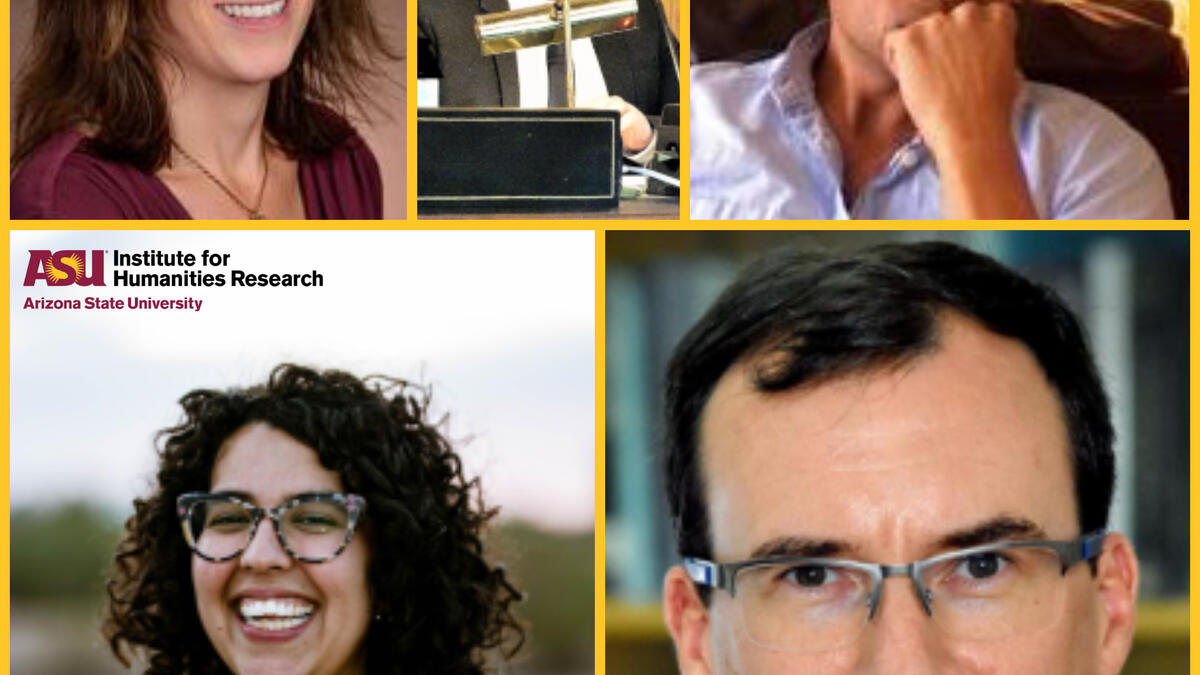ASU's Institute for Humanities Research announces 2023–24 seed grant recipients

Left to right (top): Jessica Early, Frédéric Canovas and N. Ángel Pinillos. Left to right (bottom): Anita Huizar-Hernández and Markus Cruse.
Arizona State University’s Institute for Humanities Research, or IHR, has announced five seed grant recipients for 2023–24.
The IHR seed grant program supports humanities-based projects that engage with social challenges in the past, present or future. Successful projects employ humanities or creative interdisciplinary methodologies. The purpose of the program is to enable scholars to develop their research reputation in their field through increased publications, enabling them to be competitive for national grants and major fellowships. The grant also helps enhance the impact of their research by enabling them to disseminate and translate their work to a broader public.
“The IHR is excited to support this year’s seed grant recipients and their innovative research projects,” said Ron Broglio, institute director. “We are honored to collaborate with our humanities colleagues to help with funding to jump-start their work — that will lead to external funding opportunities.”
The 2023–24 IHR seed grant recipients are:
Frédéric Canovas, faculty head of French and Italian and associate professor, French, School of International Letters and Cultures
“Performing Gender at the Time of Colette” aims to bring the work of French writer Colette (1873–1954) and her peers on gender to the ASU community, with a Gay Identities in Modern French Culture course in fall 2023, as well as a series of free public lectures by international scholars specializing in the works of Colette and other female writers and performers of her time, as well as scholars in gender and performance studies.
Markus Cruse, director of graduate studies and associate professor, French, School of International Letters and Cultures
“World Conquest in Medieval Eurasian Literature and Art” examines the origins, uses and effects of ideas about global domination in medieval Eurasia. It focuses on the depiction of figures including Alexander the Great, Julius Caesar, Genghis Khan and Tamerlane in French, Latin, Persian and Mongolian texts, and in images produced across Eurasia. This book project shows the deep roots of ideas about global domination that persist to the present, such as Russia’s invasion of Ukraine, Chinese and U.S. foreign policy, and multinational corporate strategies and capital discourses. This book will illustrate how and why world conquest was normalized in premodernity on a global scale.
Jessica Early, associate chair (personnel) and professor, English (with co-PI Joe Buenker, ASU associate librarian, Humanities Division)
“A systematic review of qualitative research in the teaching of secondary writing.” The literature on teaching writing in American secondary (grades 6-12) classrooms has proliferated over the past few decades, crossing geographical disciplinary, theoretical and methodological boundaries. This project will be a systematic review of research in the teaching of secondary writing from the past 50 years, representing a significant contribution to the field of writing research for scholars and teachers across the globe.
Anita Huizar-Hernández, associate professor, School of International Letters and Cultures (with co-PI Stella Rouse, faculty consultant, Hispanic Research Center)
“A Virtual Exhibition of the Hispanic Research Center’s Latinx Art Collection.” The Hispanic Research Center at ASU has a world-class collection of Latinx art, rivaling the depth and breadth of the most prominent holdings in any location. However, the over 500 pieces of artwork are largely stored offsite in a warehouse and are inaccessible to the public. This project digitizes a subset of this artwork and makes it publicly available as a virtual exhibition, allowing students, scholars and community members from around the world to access this incredible artwork alongside interpretive materials that contextualize its historic and cultural significance for Latinx and other communities.
N. Ángel Pinillos, associate professor, School of Historical, Philosophical and Religious Studies
“Philosophical Skepticism in the Real World.” Philosophical skepticism is one of the most significant and enduring ideas in the history of Western philosophy. A common view about skepticism espoused by David Hume, C.S. Peirce, Ludwig Wittgenstein and many other philosophers is that it is an esoteric theoretical invention with little relevance to practical matters. Recent work reveals that this idea may be mistaken. Through survey experiments, corpus research and the study of conspiracy theories, this project investigates the real-world impact of philosophical skepticism as it spontaneously arises in society at large.
The Institute for Humanities Research advances the research, access and engagement mission of the university through the study and promotion of all humanities disciplines, an endeavor central to the understanding and resolution of the most challenging problems of our times.
Learn more about the institute's seed grant program.
More Arts, humanities and education

ASU graduate education programs are again ranked among best
Arizona State University’s Mary Lou Fulton College for Teaching and Learning Innovation continues to be one of the best…
ASU FIDM students to see their designs on the runway at Uncertainty Fashion Showcase
Nola Hill is perfecting every stitch of her fashion design collection, which she started conceptualizing last summer.She is among…

ASU+GSV Summit brings experts together to discuss advancements in education
Arizona State University President Michael Crow kicked off the ASU+GSV education technology summit in San Diego on Monday with a…

